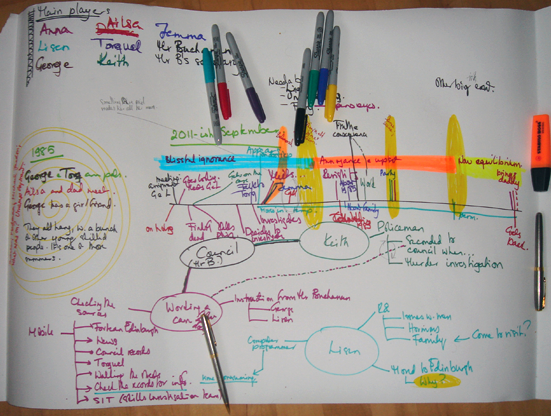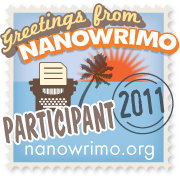This Fiction Friday prompt from Write Anything was particularly difficult and I’m not happy with the result but, in the spirit of whatever I’m sharing it anyway. The prompt, to write a scene where Santa meets with his PR people, was fun and I thought it would be interesting to write about issues not with him but the team that supports him. I wanted to show the cracks in the cheerful veneer, pull a Pinter on the Christmas family. It didn’t work. The one little idea in these 753 words that I find interesting is Mrs Santa’s job.
Fragment, Friday 23 December
“But listen to her, dear” Mr Santa said to Mrs Santa, “she knows what she’s talking about.”
Mrs Santa sighed and took a tighter grasp of her knitting needles.
“Sweetness,” she said, somewhat tartly, “I know that Ms Yarrow knows what she’s talking about. Yarrow and Yule have done a very good job with our PR for years. However…” she fixed Ms Yarrow with a steely gaze, “we’ve had this conversation before.”
“Times change, Mrs Santa, times change.”
“And we have to change with it!” Mr Santa stood up and walked over to the sofa where Mrs Santa was sitting. The atmosphere in the room was tense. Everyone there knew that this conversation would be difficult. Ms Yarrow felt for Mrs Santa. What they were asking her to do was not easy. She too walked over to the sofa. Pulling up a chair she sat down immediately opposite Mrs Santa and looked at her.
“Yes, we’ve had this conversation before. Last time, we decided against this particular course of action. This time, things are different: the mood of the age is different. We need a drastic image change to keep popularity.”
Mrs Santa was focused on her knitting. Her movements were stiff with anger. She dropped the needles into her lap and looked straight at Ms Yarrow.
“In the fifties we decided that Mr Santa needed a comfortable, nonthreatening companion, not a sex-bomb, not a working woman. Over several years we changed the colour of my hair, I gained weight, started wearing frumpy clothing. I left work – work that I loved – and dedicated myself to keeping house. I learned to knit and sew, bake and make jam. I took up the traditional role you wanted me to fulfil. Now, you ask me to go the other way.”
Ms Yarrow nodded.
“Yes. The family image that you portray is not washing with our test subjects. We thought that, considering the economy and all the trouble in the world, they’d love the fact that Santa still runs a mom and pop shop. But they don’t. They think that you’re setting a bad example, lolling about at home, cooking fatty foods and spoiling the elves.”
“They do, do they?” Mrs Santa’s voice was ice. “They think I’m a bad example?” She picked up one of the balls of yarn on the sofa next to her and fiddled with it, pulling out a piece of yarn, twisting it, pulling, twisting.
“Yes. They also think that you should try a little harder, make more of yourself. The way you look. You know, lose some weight, maybe, wear more fashionable outfits.”
“More fashionable outfits?”
“Yes. The red and white prairie frock is so 1970s.”
“I thought 1970s was the look?”
“Only if it’s retro. Not when it’s unchanged since… Lipstick wouldn’t hurt either. And botox.”
“I see. Talking of the 70s…”
“Yes, dear?” Santa thought it was safe for him to enter the conversation again. He could tell that his wife was keeping her temper under control. She was as tightly coiled as the piece of yarn she was worrying. She had always had a fiery temper, had Mrs Santa.
“I remember asking, in the 70s, if it wasn’t time to update my image a little. If I should go back to work, outside the home, you know, to do what other women were doing back then. To show that we were all for women’s lib.”
“But darling, we weren’t. We really weren’t . Not back then.” Santa laughed.
“I was.” The piece of wool in Mrs Santa’s hand broke.
Ms Yarrow took hold of Mrs Santa’s hands, stopping their fidgeting.
“The world wasn’t. What the consumer in the 70s wanted to see as the embodiment of Christmas spirit was a stay at home grandma who cooked for Santa. Back then, men was still the main Christmas shopping demographic: they needed to know that their hard work was needed, was necessary and appreciated. Now, we’re selling to women and girls. They need to see you more active, more out there, more like them.”
“More out there? My skills are 50 years out of date. There isn’t a lab in the world that would employ me now.”
“We’ll get you on a back to work scheme. You could work with kids?”
“I don’t want to work with kids. I’m a scientist. I’m a geneticist, to be specific.”
Ms Yarrow sat back on her chair.
“Yes. We need to talk about that too. We really need to talk about that.”

 I was doing well and the words were coming at a decent rate. Then the terror of weeks two. First I lost a day due to cold and then I fell out of love with one of my characters, two minutes into writing him. It’s happened before. The first time I tried writing a book-sized story I killed my main character after six pages because she irritated me. I then followed her white knight for another couple of pages before I got bored with him and gave up on writing a book. (I was 16. Cut me some slack.)
I was doing well and the words were coming at a decent rate. Then the terror of weeks two. First I lost a day due to cold and then I fell out of love with one of my characters, two minutes into writing him. It’s happened before. The first time I tried writing a book-sized story I killed my main character after six pages because she irritated me. I then followed her white knight for another couple of pages before I got bored with him and gave up on writing a book. (I was 16. Cut me some slack.)